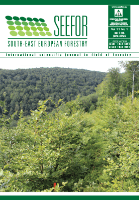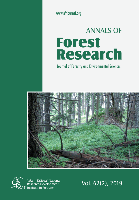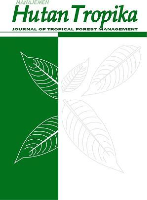
Revista Cubana de Ciencias Forestales
Scope & Guideline
Championing accessible research for global forestry challenges.
Introduction
Aims and Scopes
- Forest Ecology and Biodiversity:
The journal publishes studies related to the ecological dynamics of forest ecosystems, including species diversity, forest structure, and the impacts of environmental changes on biodiversity. - Sustainable Forest Management:
Research on practices and policies that promote sustainable management of forest resources, ensuring that ecological integrity is maintained while meeting human needs is a core focus. - Agroforestry Systems:
The journal includes investigations into agroforestry practices that integrate trees into agricultural landscapes, exploring the benefits for both productivity and environmental health. - Forest Products and Utilization:
Studies on the utilization of forest products, including timber and non-timber forest products, are significant, emphasizing sustainable harvesting and economic implications. - Restoration Ecology:
Research on restoration practices aimed at rehabilitating degraded forests and enhancing ecosystem services is a key area, reflecting a commitment to ecological restoration. - Climate Change and Forest Response:
The journal addresses the impacts of climate change on forest ecosystems, evaluating tree species responses and adaptive management strategies.
Trending and Emerging
- Carbon Sequestration and Climate Mitigation:
There is a growing emphasis on studies evaluating carbon storage in forests and their role in climate change mitigation, reflecting global concerns about greenhouse gas emissions and the role of forests in climate policy. - Phytoremediation and Environmental Recovery:
Research focusing on the use of plants for the remediation of contaminated environments is trending, indicating a significant interest in ecological restoration and sustainable land management. - Participatory Forestry and Community Engagement:
Emerging themes include participatory approaches in forestry, emphasizing the importance of community involvement in sustainable forest management and conservation efforts. - Technological Innovations in Forestry:
There is an increasing trend towards integrating technology in forestry research, including remote sensing and modeling approaches to assess forest dynamics and management. - Agroecological Practices:
Research on agroecological practices within forestry systems is gaining traction, highlighting the intersection of agriculture and forestry for sustainable land use.
Declining or Waning
- Traditional Forest Uses:
Research on traditional uses of forests and forest products has decreased, possibly reflecting a shift towards more modern and sustainable practices and innovations in forest management. - Urban Forestry:
While still relevant, studies specifically focused on urban forestry practices have become less frequent, potentially overshadowed by broader ecological and sustainable management issues. - Species-Specific Studies:
Research focused on individual species without broader ecological or management context is becoming less common, as there is a growing emphasis on ecosystem-level studies. - Historical Forest Management Practices:
Papers analyzing historical forest management practices are declining, suggesting a move towards contemporary and forward-looking approaches in forest science.
Similar Journals

SEEFOR-South-East European Forestry
Advancing sustainable forestry practices in South-East Europe.SEEFOR-South-East European Forestry is a premier open-access journal dedicated to advancing knowledge in the field of forestry and environmental science. Published by the CROATIAN FOREST RESEARCH INSTITUTE, this journal has been operational since 2010, providing a platform for research that focuses on the unique forestry dynamics of the South-East European region. With an ISSN of 1847-6481 and an E-ISSN of 1849-0891, SEEFOR is recognized for its commitment to disseminating high-quality research that addresses critical issues in forestry management, conservation, and sustainable development. The journal is indexed in Scopus, placing it within the third quartile (Q3) of forestry journals, reflecting its significance within the academic community. SEEFOR aims to connect researchers, practitioners, and policymakers, fostering collaboration and innovation in fostering sustainable forestry practices in Croatia and beyond. Submissions are welcome in a range of areas including forest ecology, policy development, and socio-economic impacts, making it an invaluable resource for professionals and students alike.

Small-Scale Forestry
Fostering ecological stewardship through research.Small-Scale Forestry, published by Springer, is a leading journal dedicated to advancing knowledge and research in the field of forestry, focusing particularly on sustainable practices and management of small-scale forest systems. With an ISSN of 1873-7617 and E-ISSN 1873-7854, this esteemed journal has established its significance in the academic community, evidenced by its Q2 ranking in Forestry and its position within the 69th percentile in Scopus. This journal welcomes contributions that span various themes within forestry, encompassing ecological, economic, and social dimensions, thus appealing to researchers, practitioners, and students alike. Although Small-Scale Forestry does not currently operate under an open access model, it provides critical insights that contribute to the global discourse on forest management, sustainability, and biodiversity, fostering a greater understanding of the vital role that small-scale forestry plays in environmental stewardship.

Austrian Journal of Forest Science
Fostering ecological knowledge for a greener future.Austrian Journal of Forest Science, published by OSTERREICHISCHER AGRARVERLAG, is a distinguished peer-reviewed journal dedicated to advancing knowledge in the fields of forestry and ecological science. With an ISSN of 0379-5292 and an E-ISSN of 0375-524X, this journal serves as a vital platform for researchers, professionals, and students alike, aiming to disseminate innovative research findings, methodologies, and case studies pertinent to forest conservation, management, and policy. Situated in Austria, its diverse scope encompasses critical topics within ecology, evolution, and biodiversity, evidenced by its competitive quartile rankings in 2023, placing it in Q2 for Forestry and Q3 in other related fields. The journal is committed to fostering a deeper understanding of forest ecosystems, making it an essential resource for anyone invested in sustainable forestry practices and environmental policy.

Annals of Forest Research
Connecting scholars to foster environmental stewardship.Annals of Forest Research is a peer-reviewed journal dedicated to advancing knowledge in the fields of forestry, ecology, and plant sciences. Published by EDITURA SILVICA in Romania, this journal has been an open access publication since 2008, providing a platform for researchers to share their insights and findings with a global audience. The journal operates under a rigorous selection process, reflected in its positioning within the Q2 category in Forestry and Q3 in both Ecology and Plant Science as of 2023. With Scopus rankings indicating a solid percentile among its peers, Annals of Forest Research continues to play a vital role in disseminating innovative research and fostering scholarly dialogue. Researchers, professionals, and students are encouraged to explore its diverse range of articles, which address both foundational and contemporary issues in forest management and environmental sustainability, contributing to the sustainable use and preservation of forest ecosystems.

Forest Ecosystems
Navigating the complexities of forest ecosystems.Forest Ecosystems is a prestigious open access journal published by KEAI PUBLISHING LTD, dedicated to advancing knowledge in the fields of forestry, ecology, and conservation. Established in 2014 and located in Beijing, China, this journal has rapidly gained prominence, achieving Q1 status in multiple categories, including Ecology, Evolution, Behavior and Systematics, and Forestry in 2023. With an impressive rank of 19 out of 174 in the Scopus category of Agricultural and Biological Sciences - Forestry, it stands in the 89th percentile, reflecting its influential contributions to the field. The journal fosters scholarly discourse and disseminates innovative research aimed at understanding forest ecosystems and their vital role in our environment. Offering a robust platform for researchers, professionals, and students, Forest Ecosystems ensures accessibility through its open access format, enabling a wider audience to engage with and benefit from cutting-edge research dedicated to the stewardship of forest resources.

EUROPEAN JOURNAL OF FOREST RESEARCH
Championing Open Access to Forest Research ExcellenceThe European Journal of Forest Research (ISSN: 1612-4669; E-ISSN: 1612-4677), published by Springer, stands at the forefront of advancing the field of forestry and plant sciences. With a distinguished reputation reflected in its Q1 category rankings in both Forestry and Plant Science for 2023, this journal excels in disseminating high-quality research that addresses the critical challenges facing forest ecosystems across Europe and beyond. Established in Germany, the journal has transitioned through various phases since its inception in 1996, striving to integrate innovative research findings that promote sustainable forest management and conservation strategies. As part of a rich academic tradition, it boasts a commendable ranking within the Scopus database, placing it in the top echelons of its category. Researchers and practitioners alike can benefit from its commitment to open access options, ensuring that cutting-edge studies are accessible to a global audience. The European Journal of Forest Research serves as an essential platform for knowledge exchange, aiming to enhance the understanding of forest dynamics and improve the management of forest resources in the face of a changing climate.

BALTIC FORESTRY
Transforming Forestry Through Cutting-Edge ResearchBALTIC FORESTRY, published by the INST FORESTRY LRCAF in Lithuania, is a prominent academic journal that serves as a platform for disseminating cutting-edge research in the field of forestry. With an ISSN of 1392-1355, this journal is dedicated to advancing knowledge on sustainable forest management, ecological impacts, and resource conservation, among other vital topics. As of 2023, it has been categorized in the Q3 quartile for forestry in Scopus, indicating its solid reputation among peer-reviewed publications, ranking #95 out of 174 in the realm of Agricultural and Biological Sciences. BALTIC FORESTRY features contributions from researchers across the globe and encourages innovative approaches to solving contemporary challenges in forestry, making it an essential resource for professionals, scholars, and students alike. Although it operates under subscription-based access options, the journal's commitment to fostering academic discourse is unwavering, aiming to bridge the gap between theory and practice in forest science.

FORESTRY
Empowering sustainable forestry through rigorous scholarship.FORESTRY is a prestigious journal dedicated to the advancing knowledge and innovative practices in the field of forestry, published by Oxford University Press. Established in 1927, it encompasses a rich history of scholarly contributions and has evolved to maintain its relevance, addressing contemporary issues and research in forestry and related disciplines. With an impressive Q1 ranking in the category of Forestry, this journal holds a notable position within the Scopus rankings, being placed 20th out of 174 in the Agricultural and Biological Sciences domain, highlighting its significant impact with an 88th percentile standing. Researchers, professionals, and students can access critical insights into forestry management, ecology, and policy, facilitating informed decision-making and fostering sustainable practices. While Open Access options are currently not available, the journal's rigorous peer-review process ensures the publication of high-quality research that contributes both to academic advancement and practical applications in forestry worldwide. The comprehensive coverage from 1927 to 2024 makes FORESTRY an invaluable resource for anyone invested in enhancing the field of forestry.

Jurnal Manajemen Hutan Tropika
Championing the future of tropical forest management.Jurnal Manajemen Hutan Tropika, with ISSN 2087-0469 and E-ISSN 2089-2063, is an esteemed academic journal published by the Bogor Agricultural University, Faculty of Forestry in Indonesia. Since its inception in 1999 as an Open Access journal, it has been dedicated to advancing knowledge in the fields of ecology, forestry, and related environmental sciences. Aiming to provide a robust platform for disseminating research, it has achieved notable rankings within Scopus, including a Q3 classification in Ecology and Ecology Evolution, as well as a Q2 ranking in Forestry for 2023. The journal's commitment to open access ensures that vital research findings are readily available to researchers, professionals, and students alike, fostering collaboration and innovation in tropical forest management. Located at KAMPUS IPB DARMAGA, BOGOR, JAWA BARAT, this journal continues to be a significant resource for enhancing sustainable forest practices and contributing to ecological understanding in the region and beyond.

ANNALS OF FOREST SCIENCE
Bridging Research and Practice in Forest ConservationANNALS OF FOREST SCIENCE, published by Springer France, stands at the forefront of ecological research, contributing significantly to both the fields of Ecology and Forestry, as evidenced by its prestigious Q1 ranking in both categories for 2023. Since its inception in 1999, this journal has become an essential resource for academics, practitioners, and students who are eager to explore the complexities of forest ecosystems and their interactions with global environmental changes. With an ISSN of 1286-4560 and E-ISSN 1297-966X, it disseminates cutting-edge research and critical reviews that enhance our understanding of forest science. Although it does not offer open access, the journal continues to be a pivotal platform for presenting innovative scientific findings that address the pressing challenges of forest management and conservation. Its significant impact factor reflects the high-quality contributions that have made a lasting mark on the discipline.